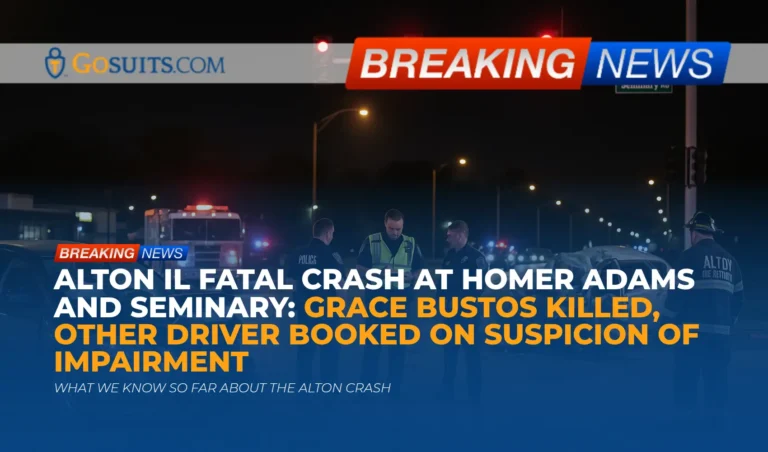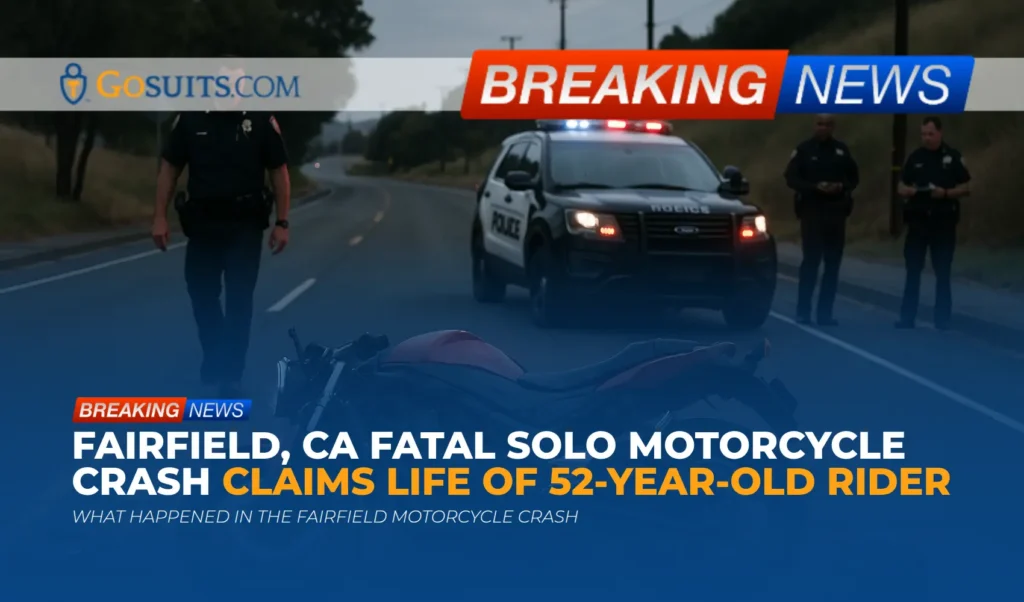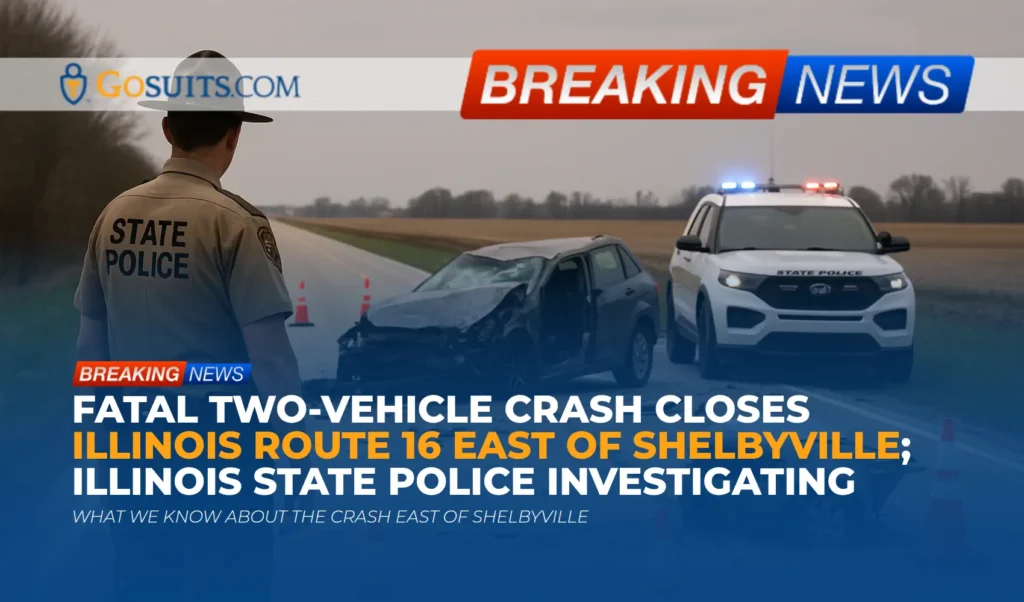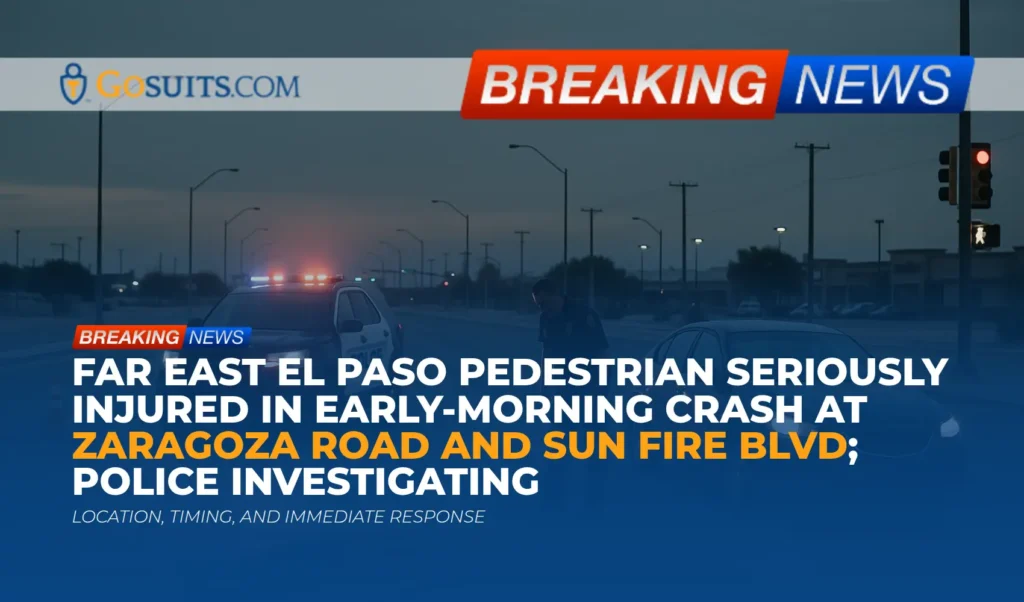- What We Know So Far About the Alton Crash
- Agencies Involved and Their Roles
- What Families Can Do In the First Days
- How to Obtain Key Records and Documents
- Understanding Potential Civil Liability in Illinois
- Insurance and Compensation Pathways
- Evidence, Reconstruction, and Preserving Proof
- Safety Context: Impaired Driving and Teen Drivers
- Grief, Practical Logistics, and Supportive Resources
- Key Deadlines That Can Affect Civil Claims
- Talking With Insurance Companies
- Commentary from Gosuits Alton, Illinois Personal Injury Attorney
- Why Taking Thoughtful Action Now Matters
What We Know So Far About the Alton Crash
Alton police responded to a serious two-vehicle collision at approximately 9:05 p.m. on Friday night at the intersection of Homer Adams Parkway and Seminary Road in Alton, Illinois. According to information reported publicly, 17-year-old driver Grace Bustos was operating one of the vehicles and died at the scene. Her mother, who was also in the car, was airlifted to a St. Louis area hospital and is reported to be in stable condition. Police said the driver of the other vehicle showed signs of impairment and was booked by the Alton Police Department. The Alton Police traffic division was assisted by the Illinois State Police Traffic Crash Reconstruction Team and the Madison County Coroner’s Office. Parts of Homer Adams Parkway were closed for several hours while officials investigated. The investigation is ongoing.
Our thoughts are with all who are grieving and recovering. The details available are still preliminary. When law enforcement indicates impairment, it typically triggers a thorough crash reconstruction, collection of toxicology evidence, and possible pursuit of both criminal and civil proceedings. Families navigating these moments face grief and urgent practical decisions at the same time.
Agencies Involved and Their Roles
Multiple public agencies play distinct roles after a fatal roadway collision. Understanding what each does can help families know who to contact and why certain documents are not available immediately.
Alton Police Department
Local police typically secure the scene, interview witnesses, document physical evidence, and generate the primary crash report. If impairment is suspected, officers may administer field sobriety testing, request chemical testing, and coordinate with prosecutors. The police report is often the foundational record for insurance claims and later civil litigation, although it may not be immediately released while the case is active.
Illinois State Police Traffic Crash Reconstruction Team
The reconstruction team assists local agencies in complex or fatal crashes. They use measurements, vehicle inspections, data from vehicle event data recorders where available, and roadway evidence to analyze speed, braking, vehicle paths, and impact dynamics. Their findings can inform fault determinations and are often critical in civil cases. More information about the Illinois State Police is available at https://isp.illinois.gov.
Madison County Coroner’s Office
The coroner investigates deaths within the county, including transportation fatalities. The office may conduct or coordinate autopsies, determine cause and manner of death, and maintain related records. Certain coroner records become public, while autopsy details may be released to next of kin or the legal representative of the decedent’s estate in accordance with Illinois law and the Illinois Freedom of Information Act.
What Families Can Do In the First Days
These first days are about caring for people and making measured, informed choices. The list below offers general guidance that many families find helpful. Every situation is unique, and timelines vary, especially while investigations are ongoing.
- Identify the primary point of contact with investigators. It might be a family member or the personal representative for the estate. Having one person collect updates can help avoid confusion and repeated calls to officers.
- Collect basic information. Note the police incident number, the responding agency’s report number if available, names or badge numbers of the lead investigator, and any witnesses who have reached out.
- Preserve documents and communications. Save messages, hospital discharge summaries, transport records, and any photographs shared. Back up phone photos and videos taken at or near the scene by bystanders who shared them with the family.
- Avoid posting details on social media. Public posts can be located and used by insurers or opposing parties. If unsure what is safe to share publicly, pause until qualified counsel has been consulted.
- Coordinate medical follow-up. For injured loved ones, obtain and keep records of medical visits, medications, and discharge instructions. Continue recommended care even when injuries feel manageable; documentation can matter later.
- Hold off on detailed statements to insurers until after legal consultation. Adjusters, even when courteous, represent their company’s financial interests. A brief notice that a crash occurred is often enough initially while arranging a free consultation with a seasoned attorney to understand rights and options.
How to Obtain Key Records and Documents
Many critical records are held by public agencies, each with its own process and timeline. Some items are available only to next of kin or the estate’s personal representative. The references below are to authoritative government sources describing the general rules that apply in Illinois.
Police Crash Report and Supplemental Materials
- Police crash report. Start by requesting the report from the Alton Police Department when it becomes available. If the department cannot release it yet, a formal request can be made under the Illinois Freedom of Information Act. The FOIA statute, including response timelines and exemptions, is at 5 ILCS 140.
- Illinois State Police crash reports. For crashes investigated or documented by ISP, the agency provides access to traffic crash reports. See https://isp.illinois.gov/CrashReports for general information.
- Supplemental items. 911 audio, Computer Aided Dispatch logs, officer body-worn camera or dash video, and photographs may exist. Some of these are time-limited and may require FOIA requests. Portions can be withheld while an investigation is active, but requesting early helps preserve the right to receive them later.
Coroner Records and Autopsy Report
- Coroner’s office. The Madison County Coroner’s Office manages cause and manner of death determinations. Under Illinois law, certain coroner records are public, while other medical details are released to next of kin or the estate. Relevant provisions concerning coroner records appear in the Illinois Counties Code. See generally 55 ILCS 5.
- Access and timing. Autopsy and toxicology findings often take weeks. Families can call the coroner’s office to ask about status, expected timelines, and the process for certified copies once available.
Death Certificate
- Vital records. The Illinois Department of Public Health explains how to request death records and who is eligible to receive them. See IDPH Vital Records at https://dph.illinois.gov/topics-services/birth-death-other-records/death-records.html.
Medical Records
- Hospital records for injured passengers. Hospitals release records to the patient or an authorized representative. Keep discharge summaries and imaging reports, as they often become central to injury claims.
- Records of a deceased person. Federal privacy rules allow a decedent’s personal representative to access protected health information. See 45 CFR 164.502(f). Guidance from the U.S. Department of Health and Human Services is available at https://www.hhs.gov/hipaa/for-professionals/privacy.
Understanding Potential Civil Liability in Illinois
While the criminal investigation focuses on whether a crime occurred, civil law addresses accountability for harm, medical costs, and the losses felt by a family after a fatal crash. The following is general legal context from Illinois statutes. Each case turns on its facts.
Impaired Driving and Negligence
Illinois law prohibits operating a vehicle while under the influence of alcohol or other intoxicating substances. See 625 ILCS 5/11-501. Evidence of impairment, when proven, often supports negligence claims in civil court. In practice, this can streamline liability analysis in a wrongful death or injury case, though insurers still frequently contest causation and the extent of damages.

Wrongful Death Claims
Illinois’ Wrongful Death Act permits a civil action when a death is caused by a wrongful act or neglect. The action is brought by the personal representative of the deceased person’s estate for the exclusive benefit of the surviving spouse and next of kin. See 740 ILCS 180. Recoverable damages can include pecuniary losses, grief, and loss of society, among others, as allowed by statute and case law.
Survival Claims
Illinois law also allows certain claims the decedent could have brought if they had lived, such as conscious pain and suffering prior to death. These proceed under the Survival Act through the estate. See 755 ILCS 5/27-6.
Comparative Fault
Illinois applies modified comparative negligence. A plaintiff’s recovery is reduced by their percentage of fault and barred if their fault exceeds 50 percent. See 735 ILCS 5/2-1116. In multi-vehicle crashes, careful reconstruction and evidence preservation are essential to fairly allocate responsibility.
Dram Shop Liability
If a vendor unlawfully sells or provides alcohol that causes or contributes to a person’s intoxication and that intoxication causes injury or death, Illinois’ Dram Shop Act may allow a separate claim against the vendor. See 235 ILCS 5/6-21. These cases are fact specific and subject to statutory limitations and caps.
Insurance and Compensation Pathways
Families often face sudden medical costs, funeral expenses, and loss-related needs. Insurance is one of the primary avenues for financial accountability after a crash.
- At-fault driver’s liability coverage. A civil claim can seek compensation from the at-fault driver’s auto liability insurer. Adjusters may contact families quickly. It is generally wise to consult an attorney before recorded statements or signing any releases, as early offers can undervalue long-term impacts.
- Uninsured or underinsured motorist benefits. If the at-fault driver lacks adequate coverage, the decedent’s or household policies may provide uninsured or underinsured motorist coverage. These claims still require proof like any other and can be adversarial even when made to one’s own insurer.
- Medical payments coverage. Some Illinois policies include optional medical payments coverage that can help with immediate medical bills for injured occupants regardless of fault. Terms vary by policy.
- Dram shop insurance. If a dram shop claim is viable, a separate insurance policy may apply to a licensed vendor. Time limits and notice requirements are strict in this area.
Before speaking at length with any insurer, it is prudent to seek a free consultation to understand rights and the implications of recorded statements. What is said to an adjuster can be used against the claim later.
Evidence, Reconstruction, and Preserving Proof
In a case involving suspected impairment and a fatality, preserving all available evidence can be decisive. Some evidence is ephemeral and must be secured early.
- Crash scene documentation. Photographs of final rest positions, skid and yaw marks, debris fields, and road lighting are useful. If the roadway reopened hours later, much of this physical evidence may have been documented only by investigators.
- Event Data Recorder. Many passenger vehicles store pre-crash data such as speed, throttle, and braking. Preserving both vehicles promptly helps retain this information.
- Video sources. Intersection cameras, nearby businesses, or residential doorbell cameras may capture crucial angles. Video is often overwritten within days or weeks.
- Witness accounts. Collect names and contact information for anyone who saw the crash or its aftermath. Written statements taken earlier tend to be more reliable than memories months later.
- Toxicology. If impairment is alleged, toxicology results and chain-of-custody documents will matter. These are typically held by law enforcement and the coroner while the investigation proceeds.
- Preservation letters. Sending timely written requests to preserve vehicles, EDR data, and videos can help prevent spoliation. Illinois law recognizes the importance of preserving relevant evidence; a carefully drafted notice can support later motions if items are lost.
Safety Context: Impaired Driving and Teen Drivers
Impaired driving remains a leading cause of fatal crashes nationwide. According to the National Highway Traffic Safety Administration, in 2021, 13,384 people died in alcohol-impaired traffic crashes in the United States, which is about 37 deaths every day. See NHTSA’s summary at https://www.nhtsa.gov/risky-driving/drunk-driving. Teen drivers are at particular risk due to inexperience and higher crash rates per mile driven. NHTSA’s teen driving safety page provides data-driven guidance at https://www.nhtsa.gov/road-safety/teen-driving.
Beyond statistics are the stories of families and communities who carry the loss forward. Sharing accurate information, supporting thorough investigations, and reinforcing safe-driving norms are all part of preventing future tragedies.
Grief, Practical Logistics, and Supportive Resources
In the wake of a fatal crash, families balance grief with administrative tasks they never expected to face. Compassionate support and reliable information can help.
- Points of contact for information. The lead investigator at the Alton Police Department can typically advise on the status of the crash report. The Madison County Coroner’s Office can explain the timeline for cause and manner of death determinations and how to obtain certified records once completed.
- Death certificates. Obtaining certified death certificates through the Illinois Department of Public Health can be necessary for estate tasks, insurance claims, and certain benefits. See IDPH guidance at this link.
- Crime victims compensation. When a crash involves criminal wrongdoing such as impaired driving, some families may be eligible for assistance with certain out-of-pocket expenses through Illinois’ Crime Victims Compensation Program, administered by the Illinois Attorney General. Program eligibility and limits apply. See https://illinoisattorneygeneral.gov/victims/cvc.html.
- Work, school, and community notifications. Coordinating compassionate communication with employers, schools, faith communities, and teams can rally support while setting healthy boundaries.
- Grief support. Grief is deeply personal. Some families find support through local counseling, community groups, or statewide resources. For behavioral health information and referral, the U.S. Substance Abuse and Mental Health Services Administration offers public information at https://www.samhsa.gov.
Key Deadlines That Can Affect Civil Claims
Deadlines differ by claim type and defendant. Missing a deadline can end a claim, even when liability appears clear. The following are general Illinois rules drawn from the statutes themselves; unique facts may alter how these rules apply.
- Wrongful death statute of limitations. Illinois generally requires a wrongful death action to be filed within two years of the date of death, with some exceptions. See 740 ILCS 180 for the statute.
- Survival claims. Claims for the decedent’s injuries prior to death are governed by the Survival Act and by the limitations period that would have applied to the underlying claim, commonly two years in negligence cases. See 755 ILCS 5/27-6.
- Claims against public entities. Some claims against local public entities and employees carry a one-year limitations period under Illinois’ Local Governmental and Governmental Employees Tort Immunity Act. See 745 ILCS 10/8-101.
- Dram shop claims. Dram shop actions have unique time limits and requirements. See 235 ILCS 5/6-21.
Because different paths may apply at once, families often feel pressure to act before they feel ready. A brief consultation can clarify which deadlines are approaching and what should happen first to protect claims without overwhelming the family.
Talking With Insurance Companies
Insurance adjusters will often reach out quickly after a serious crash. Their role is to evaluate and minimize claims for their company. It is common to be asked for a recorded statement early on, sometimes before police investigations are complete.
- Consult an attorney first. It is best to speak with an attorney before giving any recorded statement to any insurer, including one’s own. What is said can be used against the claim later, even if said in grief or without full information. Free consultations are typically available so that families can understand their rights without cost or obligation.
- Provide minimal notice initially. A short notice that a crash occurred and claims are anticipated is usually sufficient until representation is in place.
- Do not sign releases or authorizations prematurely. Broad authorizations can allow insurers to comb through unrelated medical history. Narrow, relevant releases are preferable and can be coordinated by counsel.
- Keep records of all contacts. Note the date, time, name, and summary of each call with any insurer.
Commentary from Gosuits Alton, Illinois Personal Injury Attorney
Our hearts go out to the family and everyone affected by the tragedy at Homer Adams Parkway and Seminary Road. Losing a young person is an immeasurable loss, and we extend compassion to those grieving and to the injured loved one who is recovering. This article is intended for general information and educational purposes during a difficult time.
From a civil injury perspective, the circumstances described raise urgent questions about impairment, fault, and the preservation of evidence. When law enforcement reports signs of impairment, it often aligns with negligence under Illinois law, but proper reconstruction, toxicology, and documentation are essential to establish what happened and why. Families benefit when key records are carefully gathered and when timelines for wrongful death and survival claims are understood early.
In our experience, insurance companies and corporate defendants move quickly to protect their financial interests, not necessarily to ensure a full and fair accounting of harm. Adjusters may offer quick payments before the scope of loss is known or seek recorded statements while families are still in shock. These tactics can disadvantage those who do not realize how statements or signatures might be used later to reduce or deny claims. Waiting for a free consultation before speaking in detail with insurers can help level the playing field and prevent costly missteps.
It is also important to consider every potential source of accountability, including liability insurance, uninsured or underinsured motorist coverage, and, where facts support it, dram shop liability. Each has different notice requirements and time limits. An early, no-cost consultation focused on education can help a family map the process, identify which records to request first, and understand how to avoid common pitfalls while the official investigation proceeds.

Why Taking Thoughtful Action Now Matters
- Preservation of evidence is time sensitive. Video systems overwrite, vehicles get repaired or salvaged, and roadway markings fade. Prompt preservation letters and coordinated requests can protect crucial proof that may otherwise vanish.
- Deadlines begin to run immediately. Statutes of limitations in Illinois can be as short as one year for certain claims against public entities, and two years for many wrongful death and survival actions. Early planning prevents last-minute scrambles and missed deadlines.
- Accurate information guides smarter decisions. Understanding which records exist, who controls them, and when they will be available allows families and representatives to prioritize steps and avoid unnecessary delays.
- Insurance outreach comes fast. Insurers often call within days. Preparing in advance, including deciding who will speak and what will be shared, reduces the risk of statements being taken out of context or used to limit recovery.
- Medical documentation shapes outcomes. For injured survivors, prompt and consistent medical follow-up creates a clear picture of injuries and needs, supporting stronger claims and better health outcomes.
- Exploring all avenues prevents gaps. Liability insurance, UM or UIM coverage, possible dram shop claims, and victim compensation programs each have different rules. Systematically evaluating each path helps minimize uncovered losses.
- Clarity lowers stress. A simple plan for the next few weeks, including who will gather records, how updates will be tracked, and when to check in with investigators, can bring order to a difficult period.
Where to Call for Specific Items
- Police crash report. Contact the records division of the Alton Police Department and reference the date, location, and approximate time of the collision. If the report is not yet releasable, ask about the expected timeframe and the process to submit a FOIA request under 5 ILCS 140.
- Autopsy and coroner records. Call the Madison County Coroner’s Office for status updates, and ask about obtaining certified copies for next of kin or the estate once complete. The Counties Code governing coroner records is at 55 ILCS 5.
- Death certificates. Follow the Illinois Department of Public Health’s guidance for requesting death records: IDPH Vital Records.
- Illinois State Police materials. If the crash reconstruction involves ISP, see general instructions for crash reports at ISP Crash Reports and coordinate with the lead investigator for reconstruction timelines.
Illinois Law and Safety References
- 625 ILCS 5/11-501 Driving under the influence
- 740 ILCS 180 Wrongful Death Act
- 755 ILCS 5/27-6 Survival Act
- 735 ILCS 5/2-1116 Comparative negligence
- 235 ILCS 5/6-21 Dram Shop Act
- 745 ILCS 10/8-101 Limitations against local public entities
- 5 ILCS 140 Illinois Freedom of Information Act
- IDPH death records
- Illinois State Police crash reports
- NHTSA impaired driving overview
- NHTSA teen driving safety
- HHS HIPAA privacy information
- Illinois Crime Victims Compensation Program






